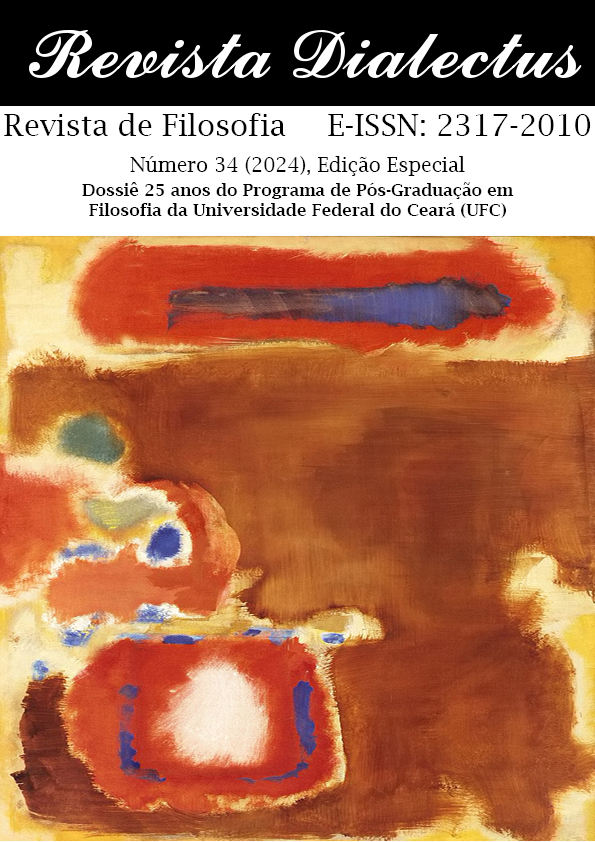SER, CONSCIÊNCIA, LINGUAGEM E DECOLONIAL: HORIZONTES DA FILOSOFIA
DOI:
https://doi.org/10.30611/2024n34id94587Keywords:
Filosofia, Horizontes, Ser, Consciência, Linguagem, DecolonialideAbstract
O artigo almeja articular os horizontes do ser (Filosofia Antiga e Medieval), da consciência (Filosofia Moderna) e da linguagem (Filosofia Contemporânea) presentes na história da Filosofia, ressaltando a dimensão cosmológica, no primeiro momento, gnosiológica, no segundo, e linguística, no último, como uma forma de explicitar os paradigmas pressupostos nos discursos filosóficos. Além desses horizontes, iremos avançar, também, em direção ao horizonte decolonial ou pós-colonial e, assim, realizar a atualização dos paradigmas atualmente vigentes, especialmente na filosofia latino-americana.
References
BUCK-MORSS, Susan. “Hegel e Haiti”. Trad. Sebastião Nascimento. In: Novos Estudos CEBRAP, n. 90, jul. 2011, p. 131-171.
CASTRO-GÓMEZ, Santiago; GROSFOGUEL, Ramón (Orgs.). El giro decolonial: reflexiones para una diversidad epistémica más allá del capitalismo global. Bogotá: Siglo del Hombre Editores; Universidad Central, Instituto de Estudios Sociales Contemporáneos y Pontificia Universidad Javeriana, Instituto Pensar, 2007.
CORETH, Emerich. Questões fundamentais de hermenêutica. São Paulo: EDUSP, 1979.
DUSSEL, Enrique. 1492: o encobrimento do outro (a origem do mito da modernidade). Trad. Jaime A. Clasen. Petrópolis: Vozes, 1993.
DUSSEL, Enrique. Filosofia del Sur y Descolonización. Buenos Aires: Docencia, 2014.
FANON, Frantz. Os condenados da terra. Trad. José Laurênio de Melo. Rio de Janeiro: Civilização Brasileira, 1968.
HABERMAS, Jürgen. O discurso filosófico da modernidade. Lisboa: Publicações Dom Quixote, 1990.
HABERMAS, Jürgen. O Pensamento pós-metafísico. Rio de Janeiro: Tempo Brasileiro, 1990.
HEGEL, G. W. F. Fenomenologia do Espírito. Trad. Paulo Meneses. Petrópolis: Vozes, 2003.
HEGEL, G. W. F. Phänomenologie des Geistes. In: Werke in 20 Bänden, Bd. 3. Revisão Eva Moldenhauer e Karl Markus Michel. Frankfurt am Main: Suhrkamp Verlag, 1970.
HEIDEGGER, Martin. Marcas do caminho. Trad. Enio Giachini e Ernildo Stein. Petrópolis: Vozes, 2008.
KAUFMANN, Walter. Hegel: A Reinterpretation. Garden City: Doubleday Anchor, 1966.
MIGNOLO, Walter. “El pensamiento decolonial: desprendimiento e apertura - un manifesto”. In: CASTRO-GÓMEZ, Santiago; GROSFOGUEL, Ramón (Orgs.). El giro decolonial: reflexiones para una diversidad epistémica más allá del capitalismo global. Bogotá: Siglo del Hombre Editores; Universidad Central, Instituto de Estudios Sociales Contemporáneos y Pontificia Universidad Javeriana, Instituto Pensar, 2007.
OLIVEIRA, Manfredo. Reviravolta linguístico-pragmática na filosofia contemporânea. São Paulo: Edições Loyola, 1996.
OLIVEIRA, Manfredo. Sobre a fundamentação. Porto Alegre: EDIPUCRS, 1993.
QUIJANO, Aníbal. “Coloniaidade do poder, eurocentrismo e América Latina”. In: QUIJANO, Anibal. Colonialidade do saber: eurocentrismo e ciências sociais. Perspectivas latino-americanas. Buenos Aires: CLACSO, 2005.
STONE, Alison. “Hegel and Colonialism”. In: Hegel Bulletin, n. 41, v. 2, 2017, pp. 1-24.
TIBEBU, Teshale. Hegel and Third World: The Making of Eurocentrism in World History. Syracuse: Syracuse University Press, 2011.
TUGENDHAT, Ernst. Lições introdutórias à filosofia analítica da linguagem. Trad. Mário Fleig et. al. Ijuí: Unijuí, 1992.
Downloads
Published
Issue
Section
License
Copyright (c) 2024 Odílio Alves Aguiar, Rodrygo Rocha Macedo

This work is licensed under a Creative Commons Attribution-NonCommercial-NoDerivatives 4.0 International License.
Authors who publish in this journal agree to the following terms:
- Authors retain the copyright and grant the journal the right of first publication, with the work simultaneously licensed under the Attribution-NonCommercial-NoDerivatives 4.0 International (CC BY-NC-ND 4.0) License, which allows the non-commercial sharing of work, without modifications and with acknowledgment of authorship and initial publication in this journal.
- Authors are authorized to take additional contracts separately, for non-exclusive distribution of the version of the work published in this journal (eg publish in institutional repository or as a book chapter), with acknowledgment of authorship and initial publication in this journal.
- Authors are allowed and encouraged to publish and distribute their work online (eg in institutional repositories or on their personal page) at any point before or during the editorial process, as this can generate productive changes as well as increase the impact and citation of published work (See The Free Access Effect).



















